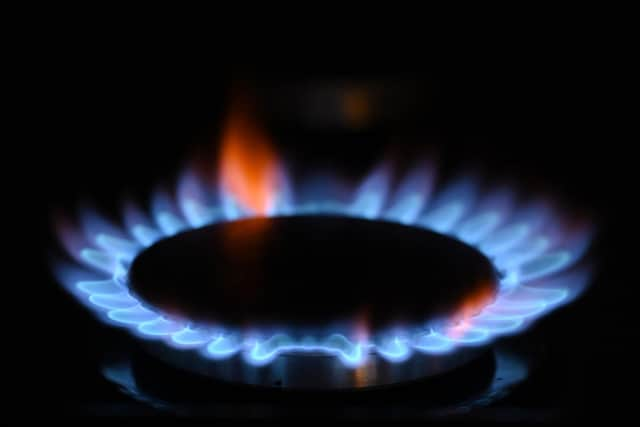Why energy suppliers must think digital to avoid collapse - Darren Auld comment
Towards the end of 2021 there was the high-profile collapse of Bulb, the largest of the many UK energy suppliers to go bust in a few months. More recently, Clydebank-headquartered Together Energy, which had more than 170,000 households on its books, went under.
And Ovo Energy is cutting a quarter of its workforce. Scotland has been hit hard by such unfortunate developments, particularly when it comes to Together Energy and Ovo who both employed large numbers of skilled people.
Advertisement
Hide AdAdvertisement
Hide AdIt’s alarming that we’re now approaching the figure of almost 30 energy companies failing in the last few months alone. But what can be done to turn this tide and bring stability and genuine consumer choice back to the energy supply market in Scotland and across the UK?


Successful digital transformation is critical to all business success. That’s why we created ClearSky Logic, a technology partner specialising in the utilities, telecoms, fintech and proptech markets. We provide rapid high-quality solutions for critical business challenges that can be realised by technology.
We have also created an artificial intelligence-driven job scheduling platform to help with the rollout of electric vehicle (EV) chargers and smart meters. Based on my experience, I believe the poor performance and ultimate collapse of many energy firms is partly down to their failure to embrace technology.
While the unprecedented increase in household gas prices is obviously a major contributing factor, companies are also spending too much time and resource on traditional customer-service practices, including creating and staffing large call centres that aren’t efficient.


The high costs such businesses are incurring in trying, and failing, to meet their customers’ needs is making it difficult for them to be profitable. Now that suppliers are being hit by soaring wholesale energy prices, the flaws in their models are being exposed, making further energy company failures inevitable.
The energy utility industry is currently going through a period of transformation, so now should be a good time for an overhaul to make sure it is in better shape to cope with future demands. It will involve further adoption of EVs, more domestic energy generation and battery power, to name just a few exciting developments.
Turmoil
But the energy industry isn’t ready for this new world. It’s in turmoil – not only due to gas prices spiking, but also because of a misguided government policy around price caps.
The energy industry gets a bad reputation but, at the moment, it is unable to pass on the hike in wholesale gas prices to consumers due to legislation. For months this has been eating away at the revenue that firms were making that were allowing them to at least survive.
Advertisement
Hide AdAdvertisement
Hide AdCompanies looking to find funding during this turbulent time have been fighting a losing battle. The fundamental problem is that legislation makes the whole sector potentially unprofitable. No company in any sector could survive this scenario. To put it simply, if a product cost me £2 to supply and, legally, I can only sell it for £1 then how is ever going to work? It doesn’t.
In my view, energy suppliers have to realise they are primarily data companies that need to focus on digital transformation. Effective and positive engagement with customers is key. For example, it’s a lack of engagement and communication that can lead to bad debts getting out of control.
Having the appropriate digital systems in place means energy suppliers can reduce their customer service costs and start making profits. This can involve such steps as improving customer portals so clients can make payments and set up direct debits without calling into a service centre.
The failure in energy suppliers didn’t start just in the last few months. Instead, this problem has been with us for years. At their core, energy suppliers are data companies, but ones where technology is often an afterthought. The modern supplier must have digital transformation at the heart of its strategy. As is key to all successful businesses, you must measure everything; otherwise you are in the dark and small problems can escalate into full-blown crises.
There are four pillars that businesses should implement. Firstly, digitise the entire customer journey from initial quote to ongoing engagement so they never need to pick up the phone. Value should be added to all customer engagement to make sure communication is rewarding rather than a chore.
Strategy
Secondly, businesses should have a solid data strategy in place. This should cover where data is held, how accurate it is and whose job it is to monitor the health of the data and resolve any issues that might arise.
Many companies see such a strategy as a "nice to have”, when it is in fact core to the business. What isn’t obvious to too many people is that most business problems are linked to incorrect, unmanaged data that seeps through into other issues and leads to, or exacerbates, customer complaints.
Integration is the third pillar to prioritise to ensure that data is flowing quickly and effectively through the business to everyone that needs to see it.
Advertisement
Hide AdAdvertisement
Hide AdFinally, invest in research and development for the future to avoid potential problems looming on the horizon. For example, suppliers need to be thinking how to compete in an EV world where massive stress is put on the energy grid and different pricing strategies will be needed to compete.
One example of a company doing things well when it comes to digitisation is Vitality in the insurance sector. It makes great use of data and creates a pleasant customer experience through such initiatives as its Healthy Living rewards that encourage people to interact.
To conclude, I’d like to emphasise that nationalisation isn’t the answer – innovation doesn’t come from committees. Today’s problems with fuel prices stem from a lack of investment in new energy sources, and from a failure of energy suppliers to realise the importance of data and technology. Action is needed now – by both businesses and policy makers.
Darren Auld is chief executive and co-founder of ClearSky Logic, an Edinburgh-based digital transformation specialist, and MyBookingHub, an artificial intelligence-driven Job Scheduling platform.
A message from the Editor:
Thank you for reading this article. We're more reliant on your support than ever as the shift in consumer habits brought about by coronavirus impacts our advertisers.
If you haven't already, please consider supporting our trusted, fact-checked journalism by taking out a digital subscription.
Comments
Want to join the conversation? Please or to comment on this article.
